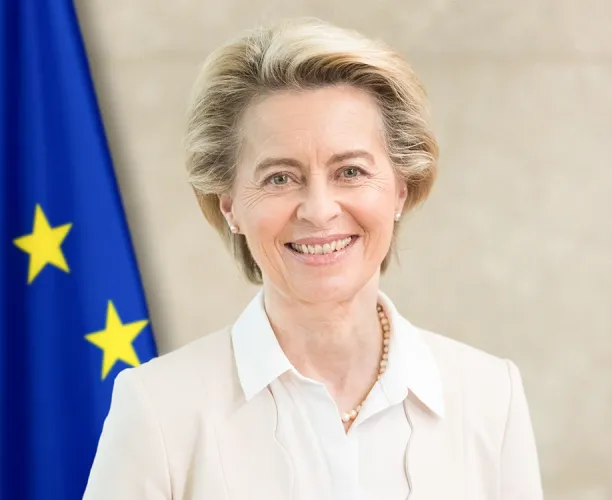

Europe in wait-and-see mode as von der Leyen’s leadership is tested
Today Ursula von der Leyen delivered the State of the Union at a moment of particular delicacy for Europe. Her leadership of the European Commission is being tested not only by political headwinds but also by the expectations of millions of citizens. Approval ratings show neither outright rejection nor firm endorsement, but rather a continent in wait-and-see mode. This fragile balance carries both risk and opportunity. Europeans are not closing the door on her leadership, yet they are looking for results that address their lives, their security, and their future.
Her introduction to SOTEU sets the tone. Von der Leyen declares:
Europe is in a fight. Make no mistake, this is a fight for our future. Our Union was born as a peace project, but the world is unforgiving. We cannot wait for the storm to pass. Yes, Europe must fight for its place in the world.
She calls for a transformation:
A new Europe must emerge. A Union with the mission to be independent, with the freedom and the power to determine our own destiny.
And she poses the central challenge:
Does Europe have the stomach to fight? Do we have the unity, the urgency, the political will, or will we remain paralysed by fighting amongst ourselves?
This determination speaks directly to the findings of our Ipsos EuroPulse study: Europeans are cautious, but they have not turned away. They are waiting for leadership that turns fragility into strength. Von der Leyen’s words match that sentiment by acknowledging doubt, but refusing resignation. The State of the Union shows that if Europe chooses unity, urgency, and political will, it can meet citizens’ expectations. She has drawn the battle lines with clarity: the fight for Europe’s future is not only necessary, it is one that can be won.
Uncertain verdict on von der Leyen’s leadership
At the European level, Ursula von der Leyen faces a fragile mandate. According to the latest Ipsos’ EuroPulse (powered by KnowledgePanel) survey, in August 2025, only 23% of citizens expressed a positive opinion of the European Commission under her presidency, while 36% were negative. The largest single group, more than four in ten, remain neutral or undecided.
This balance means her leadership is not rejected outright, but nor is it strongly embraced. Instead, most Europeans are watching and waiting leaving significant space for her to build support if she can demonstrate concrete results.

Ursula von der Leyen’s challenge to prove performance by Christine Tresignie
Beneath the overall picture, sharp national contrasts emerge. Sweden stands out as the most favourable, with positive views clearly outweighing negative ones. Croatia is close to the average, though with a notably larger share of undecided citizens. Poland appears divided, with positive and negative views almost evenly matched. In Spain and Italy, opinions hover around the EU average, showing a mixed balance but tilting towards the negative. France, by contrast, is more outspokenly sceptical, with negative perceptions outweighing the positive.
These variations show that Ursula’s challenge is uneven across the continent. In some member states she can draw on goodwill, in others she faces outright scepticism, while in places like Poland the contest is still very much open.
The moveable middle is moving
Beneath the surface of low enthusiasm lies an important group: the moveable middle. Around 70% of Europeans fall into this category of those who support the EU but want reforms or who are sceptical yet open to persuasion.

Between April and August, the share of citizens saying they are “rather sceptical” declined from 27% to 21%, while those saying they support both the EU and the way it works rose from 16% to 19%. This shift signals momentum away from hard scepticism toward greater conditional acceptance.
Support for membership of the EU
Despite criticism of how the EU functions, support for membership is robust. In August 2025, 67% of Europeans said their country’s membership is a good thing, only 13% see membership as bad. This pattern highlights a critical distinction: even where citizens are sceptical of Brussels’ performance, they rarely question the value of belonging to the Union itself. Membership is seen as the baseline of Europe’s future, not something to be undone.

Support for EU membership is strong everywhere, but the strength of conviction differs sharply. Sweden tops the league, with more than seven in ten citizens (76%) calling membership a good thing. Close behind, Spain, Poland, Italy and Croatia stand out as pillars of support.
At the other end of the spectrum, the picture diverges. In France, by contrast, support drops to 56% and a larger minority actively see membership as a bad thing.
Priorities for Europeans
The trend is evident. Democracy continues to be the most frequently cited priority, although its share in the top three has declined. At the same time, growth and particularly security have gained importance when measured by the share of citizens ranking them among their top priorities for the EU:
- Supporting economic growth and innovation: 60% in August (up from 57% in April)
- Defending democracy and the rule of law: 56% in August (down from 61% in April)
- Strengthening European defence and security: 50% in August (up from 46% in April)

Ursula von der Leyen’s challenge to prove performance
By Christine Tresignie
Europeans are not so much questioning membership, they are more so questioning performance. Ursula von der Leyen’s challenge is to turn conditional support into renewed trust by delivering results where citizens demand them most. That means:
- Anchoring reforms in the top three priorities of democracy, growth, and security.
- Mobilising the moveable middle by showing tangible, time-bound progress.
- Converting resilient support for membership into stronger satisfaction with how the EU functions day to day.
The foundations remain solid as EU membership is widely regarded as positive and scepticism is declining. Momentum is shifting in the Union’s favour and there is an opening to rebuild confidence and legitimacy. Realising this potential will depend on leadership that can align citizens’ expectations with tangible results. For Ursula von der Leyen the decisive test is whether she can turn cautious hope into renewed belief in Europe’s shared future.
Official Portrait of Ursula von der Leyen by Etienne Ansotte, © European Union, 2021 is licensed under CC BY 4.0.



